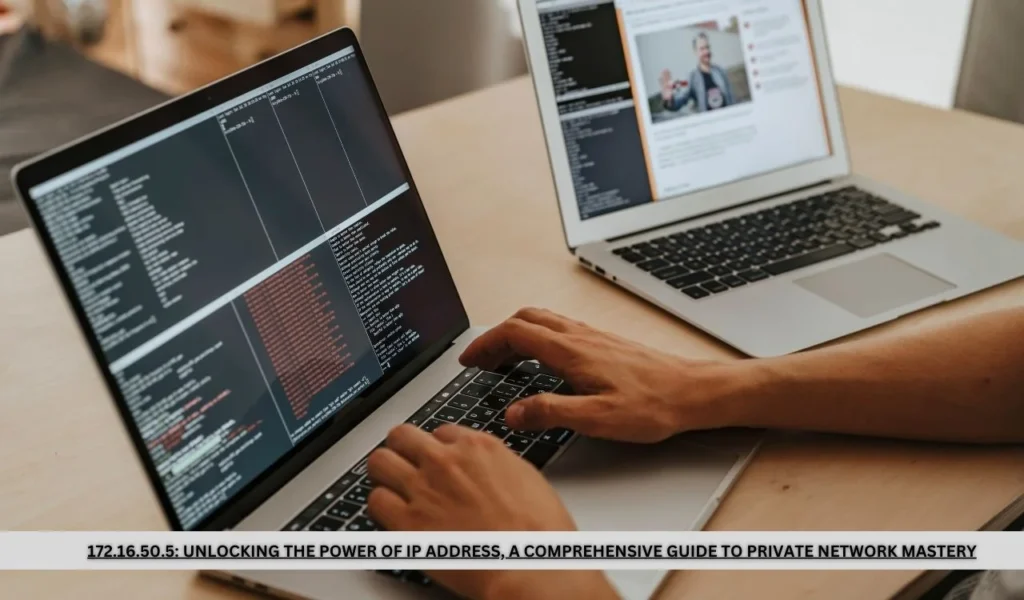An IP address is a unique identifier assigned to devices connected to a network, allowing them to communicate with each other. The IP address 172.16.50.5 is part of a range known as private IP addresses, specifically belonging to the 172.16.0.0 – 172.31.255.255 block, reserved for use within local networks. This IP address cannot be accessed directly from the internet and is primarily used in internal network setups like home or office environments.
Understanding Private IP Addresses 172.16.50.5
Private IP addresses are commonly used in Local Area Networks (LANs), allowing multiple devices within the same network to communicate without needing a unique public IP for each device. This is crucial in minimizing the exhaustion of public IP addresses and enhances network security since private IPs are isolated from the internet. The IP 172.16.50.5 serves as a local identifier and can be reused across multiple networks without causing conflicts.
Key Features of Private IP Address 172.16.50.5
- Isolation from the Public Internet: This IP cannot be reached directly from outside the network, adding a layer of security.
- Efficient Network Management: It helps manage large numbers of devices within a private network.
- Cost-Effective: Using private IPs reduces the need for purchasing additional public IPs.
Configuring and Managing 172.16.50.5
To use effectively, you need to configure your network settings appropriately. Below are the steps and considerations when configuring this IP:
- Assigning 172.16.50.5: This can be done manually or automatically using DHCP (Dynamic Host Configuration Protocol). Manually assigning requires setting the IP in the network settings of a device, while DHCP automatically assigns the IP to available devices within the network range.
- Subnetting: Subnetting helps divide the network into smaller segments, enhancing efficiency. The IP typically uses a subnet mask of 255.255.0.0, but this can be adjusted based on specific network needs.
- Firewall Configuration: Ensure your firewall settings allow the necessary traffic to and from while blocking unauthorized access attempts.
- Network Address Translation (NAT): NAT allows devices with private IPs to communicate with external networks by mapping them to a public IP. This is essential for browsing the internet while maintaining internal network security.
The Role of IP Address 172.16.50.5 in Networks
172.16.50.5 plays a pivotal role in both small and large-scale networks. It is commonly used for:
- Device Communication: Facilitates data exchange between computers, printers, and other devices within the network.
- Network Segmentation: Helps in creating isolated sections of a network for better management and security.
- IP Allocation for Internal Resources: Used by servers, network hardware, or virtual machines within a private environment.
Read Also: WUVISAAFT: Understanding Charges

How to Find 172.16.50.5 IP Address
Finding the IP address on your device or network involves a few steps:
- Using Command Prompt (Windows): Open Command Prompt and type
ipconfig. Look for the section showing your Ethernet or Wi-Fi connection to find the IP. - System Preferences (Mac): Go to System Preferences > Network, then select the active network connection to view your IP address.
- Router Interface: Log in to your router’s web interface, usually found at an IP like 192.168.1.1, and navigate to the list of connected devices to locate.
Why Use a 172.16.50.5 IP Address?
Using in a network setup offers several benefits:
- Security: Being isolated from the internet helps protect against external attacks.
- Scalability: Private IP ranges can accommodate numerous devices without extra costs.
- Controlled Access: Limits which devices can communicate, adding to the overall security posture of your network.
Troubleshooting 172.16.50.5 IP Address Issues
If you encounter issues with the following troubleshooting tips can help:
- Check IP Conflicts: Ensure no two devices on the network have the same IP address.
- Review Network Configuration: Check the subnet mask and gateway settings for errors.
- Restart Devices: Restart your device and router to refresh the IP settings.
- Update Network Drivers: Outdated drivers can cause connectivity problems, so ensure they are up-to-date.
Security Tips for 172.16.50.5 IP Address
To secure your network using follow these best practices:
- Regularly Update Firmware: Keep your router and network devices updated to protect against vulnerabilities.
- Enable Network Encryption: Use WPA3 or WPA2 for Wi-Fi security.
- Implement Access Control Lists (ACLs): Restrict access to the network to authorized devices only.
- Monitor Network Traffic: Use network monitoring tools to detect any unusual activities associated .
Benefits of 172.16.50.5
- Enhanced Privacy: Keeps devices hidden from the internet.
- Network Organization: Helps keep networks orderly and manageable.
- Versatility: Suitable for various networking needs, from small home setups to large corporate environments.
Future of 172.16.50.5
With the growing need for secure and efficient networks, private IPs like 172.16.50.5 will continue to play a crucial role in network management.
FAQs
Can the IP address 172.16.50.5 be accessed from the internet?
No, 172.16.50.5 is a private IP address and cannot be accessed directly from the internet. Access requires network configurations like VPNs or port forwarding to establish a secure connection.
How do I assign the IP address 172.16.50.5 to a device?
You can assign 172.16.50.5 manually via network settings on your device or automatically through DHCP configuration on your router.
Is 172.16.50.5 a common IP address for routers?
No, 172.16.50.5 is not commonly used as a default IP for routers; it is typically used within internal network configurations for devices.As the demand for connected devices rises, leveraging private IP addresses will be more important than ever.
Read Also: Retro Bowl 3kh0: The Nostalgic Football Game That’s Captivating Gamers Everywhere

Conclusion
The IP address 172.16.50.5 is a versatile and essential part of many private network setups, providing security, manageability, and efficiency. Understanding its role, configuration, and benefits can greatly enhance your network’s performance.












